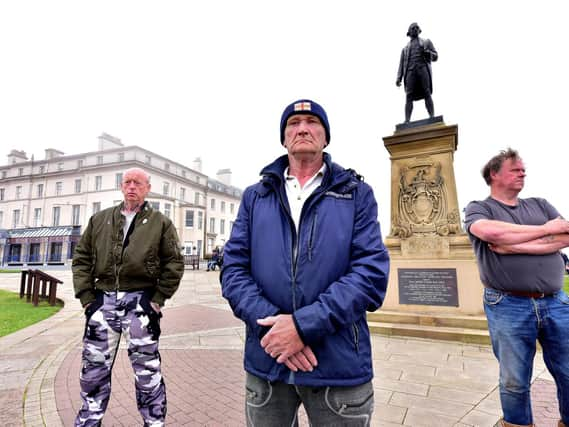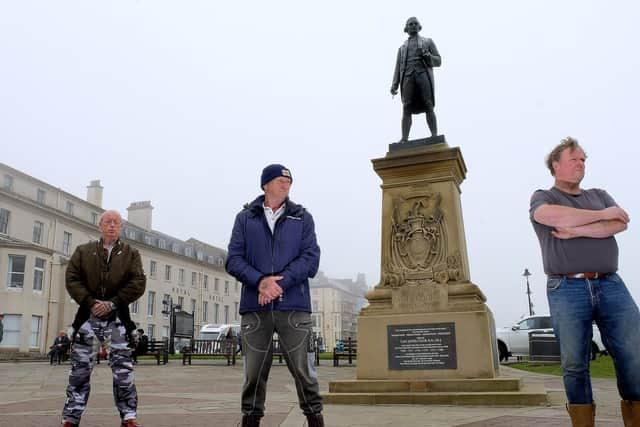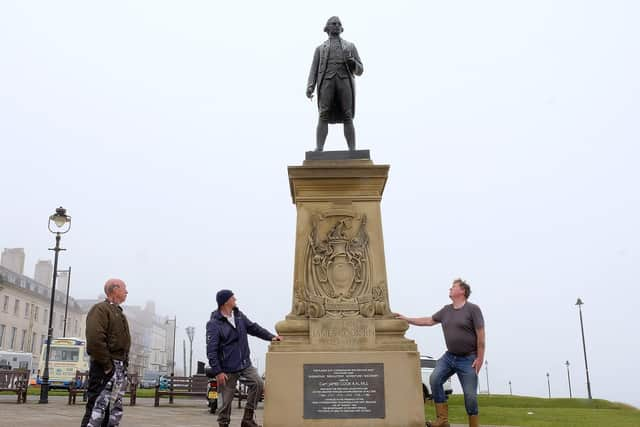Protesters stand 24 hour 'guard' at Whitby Captain Cook statue over fears monument will be vandalised


Captain Cook's monument in Whitby has accumulated a number of supporters over the weekend as the debate rages over the future of statues of controversial historical figures.
Following the toppling of slaver Edward Colston's effigy in Bristol last weekend and the defacing of several others, including a monument of Queen Victoria in Leeds, many politicians and historians have been defending statues as important tributes to British history.
Advertisement
Hide AdAdvertisement
Hide AdIn ugly scenes yesterday (Saturday) protesters across the country clashed as counter demonstrators, including members of the far-right, came out in defence of monuments such as Winston Churchill's statue in central London, which has been protectively boarded up.


Whitby's Cook statue has been among those added to the "Topple the Racists" website, listing monuments of figures who have played a part in slavery and racism throughout history.
The site is calling for many of the monuments to be moved to museums and for landmarks named in their honour to be renamed.
Captain James Cook was a Yorkshire-born explorer whose voyages included Hawaii, Australia and New Zealand. He was killed in 1779 during the attempted kidnap of the island's monarch in order to retrieve a small vessel stolen from one of his ships.
Advertisement
Hide AdAdvertisement
Hide AdSince the statue was added to the 'Topple the Racists' site, a Facebook group dedicated to the safeguarding of the monument has collected several hundred followers, with many people taking turns to stand by the statue 24 hours a day.


The statue on the West Cliff was also defaced with graffiti earlier in the week, which has since been washed off.
The decision was taken following unsubstantiated rumours that anti-fascist protesters were planning on travelling across the North York Moors in a bid to destroy the statue.
One post in the Facebook group, which has garnered more than 3,400 members, said, "taking no prisoners on shift today, carrying Whitby on our backs untill [sic] we need further assistance, it's what you've all wanted to see".
Advertisement
Hide AdAdvertisement
Hide AdIt comes after Scarborough and Whitby MP Robert Goodwill said it would be "ridiculous" to tear down Cook's statue.
Speaking to the Scarborough News, Mr Goodwill said the Black Lives Matter movement had his support, but that Captain Cook had had no involvement with the slave trade.
“It’s ridiculous to remove it,” he said.
“His challenge of going to explore places that had never been visited by Europeans before is equivalent to people walking on the moon.”
Charles Forgan, one of the management team at Whitby’s Captain Cook Memorial Museum, said: “Captain Cook had nothing to do with slavery at all.”
Advertisement
Hide AdAdvertisement
Hide AdHe said there were three instances of Māori people being killed shortly after Captain Cook's arrival in New Zealand.
Two of those were classed as self-defence and the third happened as the explorer desperately tried to make contact with the people living there, and he had felt great remorse for what happened.
“Captain Cook admired the skills and the bravery of the people he met,” he added.
“I’d be surprised if the people of Whitby would be pleased if we came along and moved the statue and put it in our courtyard.”
Comment Guidelines
National World encourages reader discussion on our stories. User feedback, insights and back-and-forth exchanges add a rich layer of context to reporting. Please review our Community Guidelines before commenting.